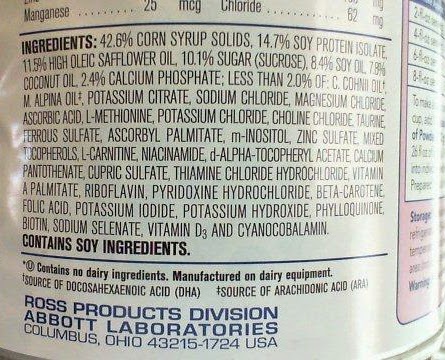But, alas, the formula companies had to do something fast to protect their market shares. There is a new battle on the forefront from both breastfeeding and formula-feeding families, it is a campaign worth of bipartisan support--improve formula ingredients and demand the manufactures use higher quality products in their manufacturing and eliminate harmful ingredients (like corn syrup solids and dangerous chemicals). Some countries do not even allow corn syrup solids in their infant foods, but in the United States we have them in spades. If formula companies can move the focus off of their companies to "nosy, judgmental, holier-than-thou, breastfeeders," well, then, they win. They strive to have a product that no one will oppose--an ambition I plan to thwart.
 |
| Similac formula in the US |
 |
| Formula label in Australia |
 |
| Enfamil ProSobee in the US |
I have NEVER attacked a formula-feeder (and for those curious, I was one), but I definitely support breastmilk, and believe moms who must supplement deserve a better option than the ones currently on the market. If we, as a society, strive to protect babies and families who need supplements, we can affect great change. I do not know of one formula-feeding mom who does not want the best for her infant, and she has chosen the only option available to her. Unfortunately, the best alternative is not good enough. Formula companies use taglines such as, "Closer than ever to breastmilk," but in reality, that can refer to the color of the fluid or a myriad of other conditions. Formula is missing many key ingredients, some of which cannot be replicated.
Let's face it, we live in a world of ever-changing technology, Purchase a new state-of-the-art phone or computer and walk out the door of the electronics store only to discover your new purchase is already being replaced by another model. Markets are consumer driven. Companies make what sells and they are constantly fighting for the market. Since we are not demanding better quality from infant foods, no one is striving to make improvements. We cannot be ignorant of the strategies formula companies use--if they can keep breastfeeding moms fighting formula-feeding moms, no one will think to fight THEM. If we demand better ingredients, formula companies lose money. If we make banked-donor milk available, formula companies lose money, if we support breastfeeding and provide support to families, formula companies lose money--follow the money.
As an IBCLC and Public Health Educator, I have asked moms the question about why they are not breastfeeding and have heard a plethora of reasons. I have heard they were having difficulty and had no help; needed to return to wok and did not have a pump; were undergoing cancer treatment, which is contraindicated to breastfeeding; were getting ridiculed by family or partner; did not want to; and many more responses. Fortunately, I asked, because in asking I was able to learn their reasons and help them overcome some of their obstacles. I was also able to find supplements that worked for them, offer education and support, or just sit with them and helped them cry. When we show compassion, empathy, sincerity and love, people understand we genuinely care.
I am convinced this entire argument is less about the asking and more about how we ask; and, to be fair, it also has something to do with how the question is received. Take time to ask, but more importantly take time to listen.
Let me paint a different scenario on how formula-feeders have used their conditions to promote breastfeeding. I have worked with or consulted for over a dozen women with cancer or going through treatments,and they are using their struggles to educate and advocate. They honestly do not mind talking about why they cannot breastfeed and why their babies deserve better options than what is currently on the market. They use their conditions as an opportunity to shed light on how limited their feeding choices are. They advocate for more breastmilk banks (like blood banks), some even share their story publicly. I personally, love that approach.
 |
| Collecting donor milk for her baby to give while undergoing iodine treatment for thyroid cancer |
No one should ever feel shamed or attacked for their feeding choice, but no one should feel silenced for sharing truth either. This is not a battle among mothers, this is a battle against large conglomerates that are forcing society to accept the status quo. Be nice, share evidence-based information, and stay sensitive. Seems simple.

.jpg)












